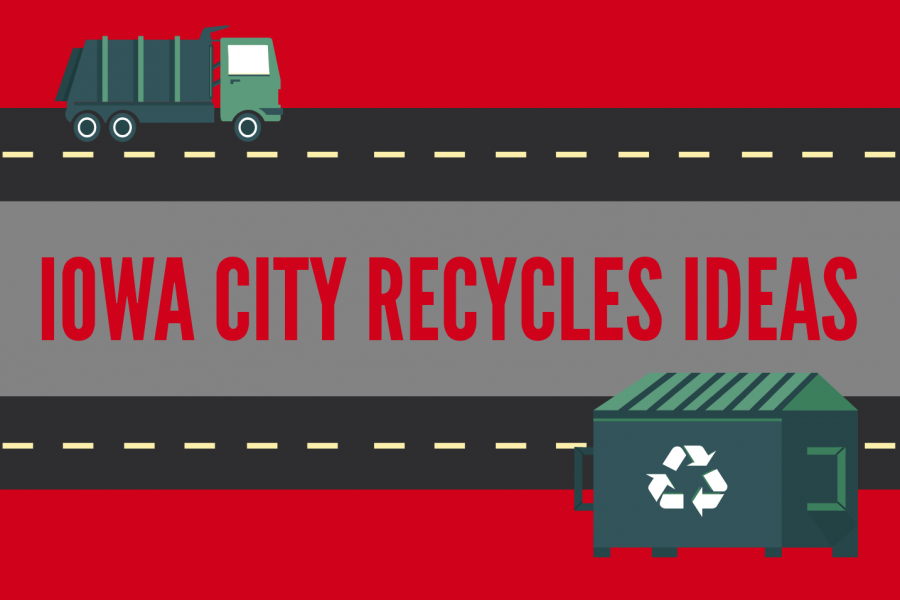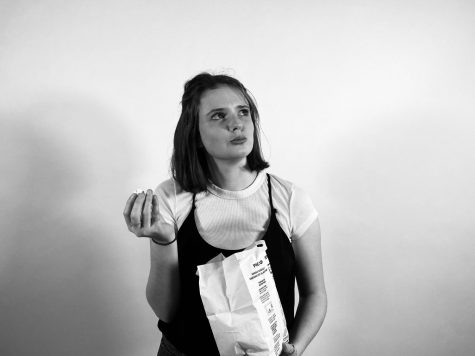Iowa City Recycles Ideas
Iowa City’s recycling system’s comings and goings could affect City High.
Infographic by Emme Perencevich
October 30, 2018
With the increased level of media coverage and public awareness regarding the health of our planet, recycling has become a much bigger issue than it used to be. While City High is working to implement an efficient recycling system in the school, there are still hurdles preventing improvements. Some obstacles have been the struggle to more become connected to Iowa City’s recycling system, improving recycling in classrooms, and implementing new policies to improve the quality of both recycling and the environment.
“Although we’ve made some improvements, there is still quite a ways to go,” said Lynsey Barnard, the sponsor of City High’s Recycling Club.
Barnard reflected on when she first took an interest in protecting the environment and how becoming the sponsor of City High’s program was the perfect outlet for her.
“In the shift from Foundations of Science to Earth & Space Science, I took a class that discussed the impact of humans on the environment and what small steps we could take to be more responsible,” Barnard said. “I also started reading more about how we can take better care of the earth, and I immediately thought of what we do at school. A few students asked if I would sponsor the club last year and it was a no-brainer for me to get involved.”
This is the second year of Recycling Club and Barnard is still working through some big challenges to improve the quality of recycling at City High.
“When we got going last year, students went around every week, picked up the recycling from every classroom and even sometimes from the lunchroom,” Barnard said. “They brought it to my room, cleaned it out, and drove it to the recycling center. There were spills, smells, and a lot of time required for this.”
Some degree of recycling has been present at City High for a long time and Barnard is hopeful that this time the eagerness of the students to improve the system at school will stick around.
“Paper and cardboard recycling has been around since before I came to City,” Barnard said. “My understanding is that students tried to make Recycling Club successful in the past, but those students graduated and it fell through the cracks. Hopefully, this time around it’ll stick.”
Some of the more major challenges that Barnard and the club face could take a long time to overcome.
“We don’t have school-wide options for glass or can recycling and we struggle getting students to use the designated recycling bins in the classrooms,” Barnard said. “We also use plastic utensils in the lunch room, so there is a significant amount of plastic being used and thrown away each day.”
One of the bigger problems that Recycling Club faces is student involvement in recycling at school. Yardley Whaylen ‘20 a student at City High School agrees.
“I would love to see us creating more awareness towards the importance of recycling so we won’t have plastic bottles in the trash when a recycling bin is nearby,” Whaylen said.
More student involvement could lead to a much more productive and efficient recycling program at City High.
“The more students who are aware and willing to help out with making recycling happen at City, the more successful we will be,” Barnard said. “That might not mean being part of the club, but something as simple as putting their plastic bottles in the right container or choosing to bring a reusable water bottle from home.”
Not only does the problem lie in the hands of City High students, but also in the overall system of delivery and drop-off of recycling.
“We are still trying to work with individuals from the district and local businesses to try and create an efficient plan for recycling pick up,” Barnard said. “We still have to [recycle it ourselves.]”
According to Jane Wilch, the recycling coordinator for Iowa City, there are trash and recycling systems that run through Iowa City, but they will not cater to the Iowa City Public Schools.
“The City of Iowa City Refuse service is legally zoned to curbside pickup single-family homes up to 4-plex apartment buildings,” said Wilch. “Everything else legally has to go through private haulers, so we would not be allowed to pick up from the school.”
The rules that control Iowa City’s collection system were originally implemented to create balance in the community.
“They were put in place by Iowa City, City Council in 1978,” Wilch said. “My guess is that the rules [applied to] provide a healthy balance between public and private services. They offer an opportunity for local businesses to tap into the hauling industry as well.”
While these rules were executed to help promote equality between businesses, they are creating chaos in the City High recycling system.
“It would be a game changer [if the city helped with the school’s recycling]. At home, I can throw a lot of my recyclables into one, single stream picked container and Iowa City picks that up,” Barnard said. “If this happened at school we wouldn’t have to haul recycling ourselves.”
Not only would support from the city provide ease to students in the Recycling Club, but it might also make it easier for everyone to recycle.
“It may actually be easier for students [if the city helped because they could] throw their recycling into one classroom container,” Barnard said. “The students who pick up the recycling often have to sift through it because it doesn’t always get put in the correct place, so it would make their jobs easier as well.”
Even with the lengths that City High could go to be better at recycling, the school is still doing much better than it used to, according to Whaylen, who has attended City High for three years.
“I definitely did not see as much recycling as there is now,” Whaylen said. “Papers in class would be recycled, but cans and bottles would often end up in the trash.”
Recycling Club often researches and explores other solutions to their biggest problems, even referring to other schools for ideas.
“We are in the process of reaching out to the City of Iowa City, Johnson County Refuse, leaders from the district, and administrators from our own school asking questions to try and find what will be the best way for recycling to become a staple of City High,” Barnard said.
According to the superintendent of the Iowa City Public Schools, Steve Murley, many of the public schools have recycling systems to collect ideas from.
“All district schools recycle mixed paper, corrugated cardboard, and returnable plastic bottles and cans in staff lounges,” Murley said. “North Central Junior High School collects compost, plastic bottles, and aluminum cans for recycling in a pilot program with Johnson County Refuse.”
Barnard has also recognized North Central’s recycling plan, but she believes that City High can do even better.
“I know North Central has a recycling plan implemented there, but if we’re going to be ‘The School That Leads,’ coming up with the best way to recycle and promoting that to other schools would be huge in living up to our name,” Barnard said.


































